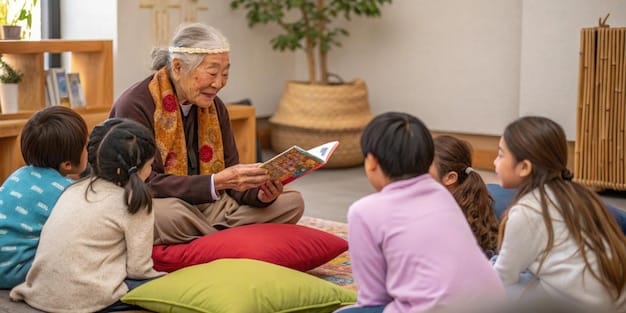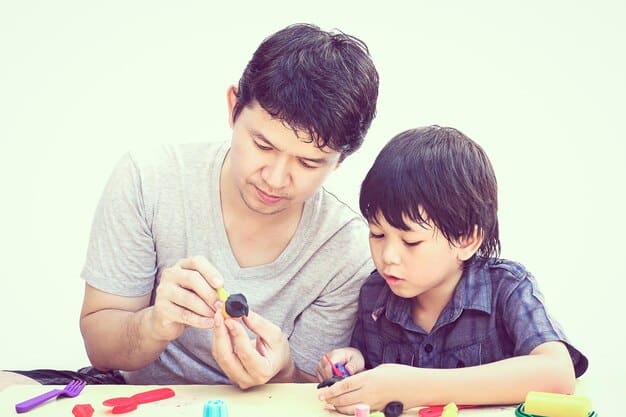Korean Parenting Styles: What US Parents Can Learn in 2025

Korean parenting styles, characterized by a strong emphasis on education, respect for elders, and close family ties, offer valuable insights for US parents in 2025, promoting well-rounded development and academic excellence.
As we approach 2025, many US parents are looking for innovative ways to enhance their children’s upbringing. Exploring different cultural approaches can provide fresh perspectives and practical techniques. Korean parenting styles: What US Parents Can Learn in 2025, offers a unique blend of tradition and practicality which may benefit your family.
Understanding the Core Principles of Korean Parenting
Korean parenting is deeply rooted in Confucian values, emphasizing respect for elders, diligence, and academic achievement. These principles form the foundation of their approach, fostering a culture of discipline and continuous improvement.
The Emphasis on Education
Education is highly valued in Korean culture, with parents investing significant time and resources in their children’s academic success. This focus extends beyond traditional schooling, encompassing extracurricular activities and private tutoring.
Respect and Filial Piety
Respect for elders and filial piety are central to Korean family dynamics. Children are taught to honor their parents and grandparents, contributing to a harmonious and supportive home environment.

Here are some core components of Korean parenting you should know:
- High Academic Expectations: Korean parents set high academic standards, believing that hard work and dedication lead to success.
- Strong Family Bonds: Family relationships are prioritized, with parents deeply involved in their children’s lives.
- Discipline and Structure: Korean parenting involves a structured approach, emphasizing discipline and responsibility.
In essence, Korean parenting combines high expectations with a nurturing environment, promoting both academic excellence and strong character development.
Key Differences Between Korean and US Parenting Styles
While both Korean and US parents share the common goal of raising successful and happy children, their approaches differ significantly. Understanding these differences can help US parents identify specific areas where they can learn and adapt.
Individualism vs. Collectivism
US parenting tends to emphasize individualism, encouraging children to express their unique personalities and pursue their individual interests. In contrast, Korean parenting leans towards collectivism, prioritizing the needs of the family and community.
Independence vs. Interdependence
US parents often strive to foster independence in their children from a young age, encouraging them to make their own decisions and take responsibility for their actions. Korean parents, on the other hand, promote interdependence, emphasizing the importance of mutual support and cooperation within the family.
To better illustrate these differences, consider the following:
- Focus on Personal Achievement: In the US, individual achievements are celebrated, while Korean parents emphasize group success and collective effort.
- Communication Styles: US parenting often involves open and direct communication, whereas Korean parenting may involve more indirect and subtle communication methods.
- Role of Extended Family: Extended family plays a more significant role in Korean parenting, with grandparents often actively involved in raising children.
By understanding these key differences, US parents can gain valuable insights into alternative parenting strategies and potentially incorporate them into their own approach.
Practical Lessons US Parents Can Adopt from Korean Parenting in 2025
While adopting all aspects of Korean parenting may not be feasible or desirable for US families, certain elements can be adapted and integrated to enhance their parenting styles. These lessons can help foster a more balanced and successful upbringing.
Setting Clear Expectations and Goals
Korean parents are known for setting clear expectations and goals for their children, particularly in academics. This approach provides children with a sense of direction and purpose, motivating them to strive for excellence.
Cultivating a Strong Work Ethic
Instilling a strong work ethic is another valuable lesson from Korean parenting. By teaching children the importance of hard work and perseverance, parents can help them develop the skills and mindset needed to succeed in life.

How to incorporate these elements into your family:
- Establish Clear Academic Goals: Work with your child to set achievable academic goals, providing support and encouragement along the way.
- Encourage Perseverance: Teach your child the importance of not giving up easily, helping them develop resilience and determination.
- Foster a Growth Mindset: Encourage your child to view challenges as opportunities for growth and learning, rather than as threats or failures.
By adapting these practical lessons, US parents can help their children develop a strong sense of purpose, a solid work ethic, and a resilient mindset.
The Role of “Jeong” in Korean Parenting and its Relevance for US Families
“Jeong” is a unique Korean concept that encompasses love, affection, and deep emotional connection. Understanding and incorporating “Jeong” into parenting can foster stronger and more meaningful relationships within US families.
Understanding “Jeong”: More Than Just Love
“Jeong” goes beyond simple love and affection, representing a profound emotional bond that develops over time through shared experiences and mutual understanding. It is a deep sense of connection and belonging.
How “Jeong” Influences Parenting
In Korean parenting, “Jeong” manifests as unwavering support and commitment to a child’s well-being. Parents prioritize their children’s emotional needs, creating a nurturing and secure environment.
- Emotional Support: Providing consistent emotional support helps children feel loved and secure, fostering healthy emotional development.
- Quality Time: Spending quality time together strengthens family bonds and creates lasting memories, reinforcing the feeling of “Jeong.”
- Empathy and Understanding: Practicing empathy and understanding helps parents connect with their children on a deeper level, fostering stronger relationships.
By embracing the concept of “Jeong,” US parents can create a more emotionally rich and supportive family environment, fostering stronger connections and deeper relationships with their children.
Addressing Potential Pitfalls and Misconceptions
While there are valuable lessons to be learned from Korean parenting styles, it’s important to address potential pitfalls and misconceptions. Blindly adopting any parenting style without considering cultural context and individual family needs can be detrimental.
Avoiding Overly Strict Approaches
One potential pitfall is adopting overly strict or authoritarian parenting approaches. While discipline is important, it should be balanced with warmth, empathy, and open communication. Excessive pressure can lead to stress and anxiety in children.
Recognizing Individual Differences
It’s also crucial to recognize that every child is unique, with their own individual needs, strengths, and weaknesses. A one-size-fits-all approach to parenting is unlikely to be effective. Parents should tailor their approach to suit their child’s specific needs.
Things to keep in mind when adopting external parenting techniques:
- Communicate Openly: Maintain open and honest communication with your children, creating a safe space for them to express their feelings and concerns.
- Focus on Balance: Strive for a balance between discipline and nurture, setting clear expectations while providing warmth and support.
- Adapt to Your Child’s Needs: Tailor your parenting approach to suit your child’s individual needs and personality, recognizing that what works for one child may not work for another.
By addressing these potential pitfalls and misconceptions, US parents can adopt the best aspects of Korean parenting while avoiding any harmful practices.
Looking Ahead: Adapting Korean Parenting for Future Generations in the US
As we move closer to 2025, it’s important to consider how Korean parenting styles can be adapted for future generations in the US. Blending traditional values with modern approaches can create a well-rounded and effective parenting strategy.
Embracing Cultural Diversity
One key aspect is embracing cultural diversity and recognizing the value of different parenting approaches. By learning from other cultures, parents can broaden their perspectives and develop more effective strategies.
Integrating Technology Wisely
Another important consideration is the role of technology in parenting. While technology can offer many benefits, it’s important to integrate it wisely, setting boundaries and promoting healthy digital habits.
Some important factors to be considered:
- Focus on Core Values: Emphasize core values such as respect, diligence, and family connectedness, adapting them to suit the modern world.
- Promote Digital Literacy: Teach children how to use technology responsibly and safely, promoting digital literacy and critical thinking skills.
- Encourage Emotional Intelligence: Foster emotional intelligence by helping children understand and manage their emotions, building strong relationships.
By adapting Korean parenting styles to suit the unique needs of future generations in the US, parents can create a nurturing and supportive environment that promotes both academic success and personal well-being.
| Key Aspect | Brief Description |
|---|---|
| 📚 Education Focus | Emphasis on academic excellence and continuous learning. |
| 👨👩👧👦 Family Bonds | Prioritizing strong family relationships and mutual support. |
| 🌱 “Jeong” Connection | Fostering deep emotional connections and unwavering support. |
| 🎯 Clear Expectations | Setting clear academic and personal goals for children. |
Frequently Asked Questions (FAQ)
▼
Korean parenting emphasizes academic achievement, respect for elders, and strong family relationships, creating a nurturing and disciplined environment for children’s development.
▼
“Jeong” is a deep emotional connection that fosters unwavering support and love in Korean families, prioritizing children’s emotional needs and relational harmony.
▼
US parents can learn to set clear academic goals and foster a strong work ethic in their children, while also balancing it with emotional support and well-being.
▼
Avoid overly strict approaches and recognize individual differences in children, maintaining open communication and a compassionate, balanced parenting style.
▼
Future generations can benefit by integrating core values with modern approaches, promoting responsible technology use, and fostering emotional intelligence for personal and academic success.
Conclusion
By understanding the core principles, practical lessons, and potential pitfalls of Korean parenting, US parents in 2025 can gain valuable insights to enhance their own parenting styles. Adapting these techniques—while prioritizing balance, open communication, and individual needs—can help foster well-rounded, successful, and emotionally intelligent children.





